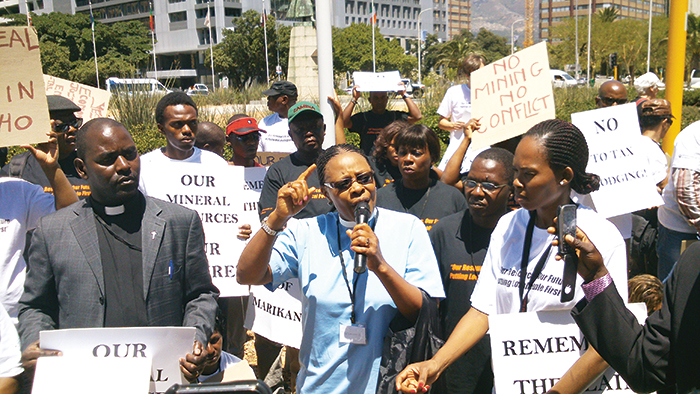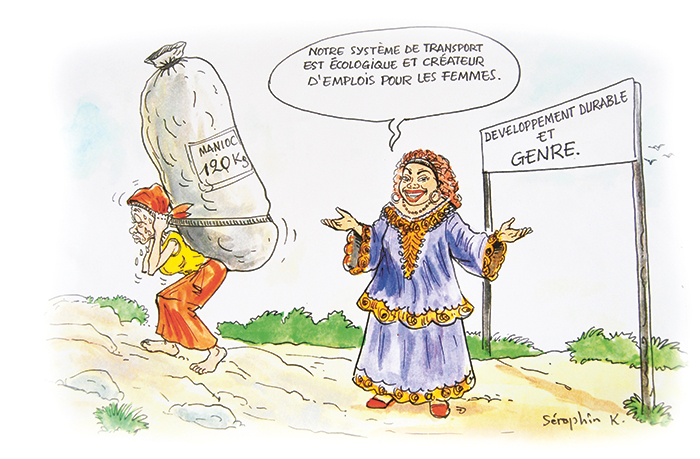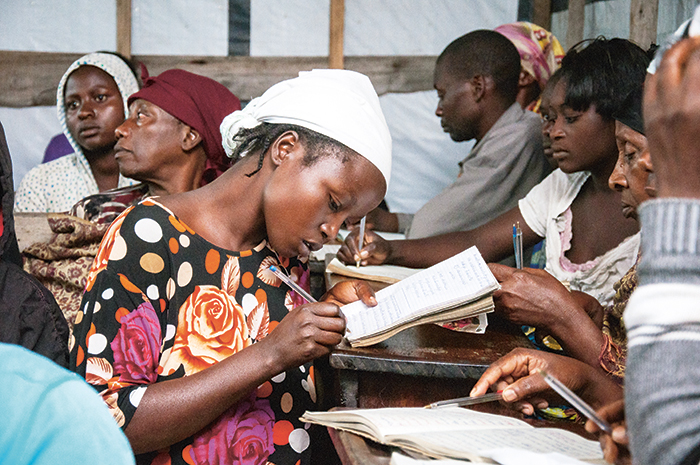
Global Report on Results

From 2011-2014 NCA has enabled many of its partners and their constituencies as agents of change in civil society to strategically engage their respective governments and the private sector. This has been made possible through addressing the shrinking space for civil society, building strategic alliances and networks for greater impact and improving the accountability of partners towards rights-holders. In relation to its partners, NCA has played the role of accompanier, challenger and facilitator. Although the cases presented here only serve as illustrations and therefore represent a small portion of what NCA has achieved, this chapter demonstrates how NCA has contributed to the overall objective of strengthening civil society in many difficult and challenging contexts.
4.1 Addressing Shrinking Space for Civil Society
4.2 Building Strategic Alliances and Networks
4.3 Improving the Accountability of NCA and Partners
4.4 Mobilising Indigenous Peoples as Rights-Holders
NCA’s partners often operate in fragile and politically unstable contexts, where the space for civil society is diminishing due to pressure from government, opposition groups and the corporate sector. NCA provides support to civil society partners and together with them seeks to protect and enhance the political space for civil society.
Whilst there have been some cases of intimidation of religious leaders defending human rights at community level, the churches enjoy a certain level of protection at national level. The respect for the churches stems in part from the fact that they represent over 90% of the population, but also from the fact that they have adopted a pragmatic and constructive approach in their interaction with authorities. However, most of the churches lack key technical skills and management capacities. NCA deliberately chose to channel all of our Angola support through churches and faith-based organisations (FBOs). NCA has been investing in a potential force in Angolan society generally ignored by most, but which is becoming more and more important as NGOs and opposition parties continue to be increasingly marginalised (see chapter 5.4).
DRC is a volatile country when it comes to human rights. Those who dare report and expose crimes against humanity, sexual violence or fixed elections risk being subjected to threats and attacks. This climate of fear and self-censorship stifles free speech and discourages open and honest criticism of government policy and the conduct of public officials. But this does not deter Solange Lusiku Nsimire from her work as the editor in chief and publisher of the independent newspaper Le Souverain.

In partnership with NCA, Le Souverain has maintained its political independence and been able to provide true information and clear analysis of the political situation as well as positive images of women in the DRC. Le Souverain has benefitted from NCA capacity building on advocacy, accountability, protection and risk assessment due to the amount of threats and attacks that the newspaper has been subjected to7. This has secured the independence of the newspaper and has contributed to expanding civil society space. Lusiku Nsimire has become a leading personality in the Press Union of the DRC. Le Souverain is recognised internationally for its exceptional journalism in an area where there is next to no free press. Most recently, she was awarded with the prestigious 2014 Courage in Journalism Award by the International Women’s Media Foundation (IWMF)8. Since 2013, she has been the coordinator of the Association des Femmes Journalistes Francophones.
7 In DRC, journalists report being threatened in Bukavu
8 2014 Courage In Journalism Awards - IWMF
9 Shrinking political space of civil society action - ACT Alliance
10 Shrinking political space of civil society action - ACT Alliance
In 2011, NCA contributed to an ACT Alliance policy paper on Shrinking political space for civil society action9. It recognises the clear dilemma between the development effectiveness agenda demanding space for and participation by civil society on the one hand and the practice of limiting the role of civil society actors and questioning their legitimacy on the other. In 2013, ACT Alliance and the Catholic network CIDSE carried out research that documented the enabling and disabling conditions under which local CSOs operate in places such as Colombia, Malawi, Rwanda and Zimbabwe10. The findings and recommendations from the two reports have been presented through side-events at several UN meetings, and NCA is committed to secure the implementations of the recommendations in its future programming.
NCA’s core partners often face limits in terms of organisational capacities. By connecting its core partners to thematically specialised organisations and wider networks, core partners gain capacity in how to hold governments and businesses accountable.
In 2010, the Norwegian aluminium giant Hydro took over the bauxite, alumina and aluminium assets and operations of the Brazilian company Vale in Barcarena. The arrival of the Norwegian company as the largest industrial player in Barcarena raised expectations among the local population, because Norway is considered to be a leading nation in the work for global standards on corporate social responsibility. NCA and local partner IEB started working for a shift in the historically problematic dynamics between the different stakeholders in Barcarena, to move them beyond conflict and co-optation. NCA’s role has been to build trust between local civil society groups, community-based groups and Hydro. As a Norwegian civil society actor, NCA has been able to maintain pressure on Hydro while at the same time build confidence between the mining company and the grassroots organisations in Barcarena, with the support of IEB. The level of trust built in the process so far would not have been possible without the intervention of NCA as a key player with a respected and rooted faith-based constituency in Norway. In 2012, NCA brought a community-based group from Barcarena to meet Hydro executives in Norway. After the visit, the company expressed their intention to support the public dialogue arena in Barcarena. Gradually, the company started up internal processes to prepare for a formal engagement with the multi-stakeholder forum that had been established. The process eventually led to Hydro’s formal engagement, soon after the municipality of Barcarena also adhered to the initiative. This has strengthened NCA’s role in Norway vis-à-vis Hydro and shown NCA’s capacity of vertical action from the grassroots to highlevel meetings. NCA has consolidated its unique added value as mediator and facilitator of processes between civil society and private sector in Brazil and Norway, as grassroots organisations would not be able to achieve this without NCA.
11 JPC is a merger of Christian Aid (CA), DanChurchAid (DCA) and NCA.
12 The Alternative Mining Indaba (AMI) was first organised in 2010 on the initiative of the Economic Justice Network, a faith-based partner in South Africa. Smaller in size than the Mining Indaba, which is held in Cape Town on a yearly basis, the AMI brings religious leaders, civil society actors and representatives from mining-affected communities together to discuss the impact of mining on communities and on the environment. The 6th AMI was held in February 2015 and brought over 300 delegates from more than 37 countries.
Prior to the establishment of the Joint Country Programme (JCP)11 in Zambia in 2011, NCA’s core partners, the churches in Zambia, realised that they needed to pay greater attention to what was happening in the mining sector. They released joint statements advocating for greater government transparency around the extractive industry and raised concerns over the issue of environmental degradation and the pollution affecting communities located close to the mines. With the support of NCA, the churches took part at the second Alternative Mining Indaba in 2011 in Cape Town12. From that gathering grew the idea of holding a separate Zambian Alternative Mining Indaba in Lusaka in 2012. JCP provided the financial and human resources to scale up the project, and connected faith-based partners in Zambia with Norwegian technical know-how. JCP in this manner was able to facilitate the creation of civil society platforms and coordinated meetings between partners in Zambia and NCA partners in the region and beyond. Platforms such as the Zambian Alternative Mining Indaba and other similar dialogue meetings have provided rights-holders with the opportunities to claim their rights to benefit from the mining industries. JCP’s partners have held three successful Zambian Alternative Mining Indabas since 2012, which are recognised by the government and mining companies, who have entered into dialogue with the rights-holders on some of the issues raised. As a result of awareness campaigns, rights-holders are able through negotiations or the courts of law to claim compensation from mining companies.
One of NCA’s working methods is to bring knowledgebased and constituency-based organisations together. For this reason, NCA brought the Kenya Youth Climate Network (KYCN) to work with religious leaders in two separate advocacy initiatives around Climate Justice and peaceful elections in Kenya. NCA was able to reduce perceived and real tensions between youth and faith leaders and at the same time facilitate an arena where they could join forces for change. Their meeting resulted in the “We Have Faith” and the “Linda Amani” campaigns. In 2011, the first campaign brought together youth from 19 countries in Africa and beyond in a 42 days’ caravan that travelled through 6 countries from Nairobi, Kenya to Durban, South Africa, which was the venue of the COP 17 (The UN Climate Change Conference). 200,000 petitions were collected along the way as part of the campaign and presented to the COP leadership addressed. During the “Linda Armani” campaign, 183 youth were involved in a 45 days’ caravan that travelled to all corners of the Kenya preaching peace in the run-up to the 2013 general elections. They collected 35,000 petitions. Both caravans were instrumental in bringing religious leaders to interreligious conferences and rallies.
Some of NCA’s core partners have hierarchical structures that can be counterproductive to social change. NCA engages and challenges core partners to play a more consistent and positive role and works to develop them into accountable institutions capable of fulfilling their roles in civil society. In order to engage and challenge partners, NCA must continuously demonstrate its own commitment to development standards and principles and mainstream these in its work and within the organisation.
NCA believes that financial malpractices and their consequences undermine rights-holders’ opportunities to improve their lives. For this reason, NCA has as one of its core principles zero tolerance against corruption. NCA has designed and conducted an online anti-corruption course for all employees as part of committing them to the NCA code of conduct. An annual report is published highlighting NCA’s efforts in combating corruption in its work13. These processes form an important basis for internal learning. One key function of NCA’s country offices is to provide capacity building of its partners in the area of financial management. NCA Sudan has systematically provided financial management training to all its partners. Some partners could previously not access most international donors due to lack of sound financial management systems. Thanks to training and accompaniment provided by NCA this situation has changed. For example, NCA’s partner SOS Sahel is now approved by international donors such as the EU and has received funds from them. This is seen as a direct result of the capacity building provided by NCA.
NCA has been a certified member14 of the Humanitarian Accountability Partnership (HAP) since 2011. Members of HAP commit themselves to meeting the highest standards of accountability and quality management. A recertification audit carried out in October 2014 found that NCA demonstrates a strong commitment to accountability principles through a strong corporate culture on rights-based approach, gender sensitivity, transparency, community participation and capacity building of staff, partners and the people NCA aims to assist. The audit also recommends NCA to continue to assist country offices and partners in developing contextualised complaints handling mechanisms and to continue to include the perspectives of the people NCA aims to assist. NCA believes that this systematic focus on downwards accountability has improved the quality of our work and that the rights-holders whom we work with and for now have a greater say in project planning, implementation, monitoring and evaluation than previously. Together with the ACT Palestine Forum, NCA decided in 2012 to enhance the ACT Alliance’s joint emergency response through developing a better understanding of what is meant by accountability. NCA Jerusalem took the lead among ACT agencies in developing the capacity on accountability of the 12 partner organisations in the ACT Forum. This initiative has led to a greater professionalisation of partners and a better understanding of how they can improve their own accountability to rights-holders.
15 ACT gender policy
NCA has adopted the ACT Gender Policy Principles15, which commit NCA to promote gender equality and gender mainstreaming within our organisation and towards partners. This can be illustrated by the case of Pakistan, where NCA has focused on ensuring systematic gender mainstreaming in humanitarian and long-term development projects. A full-time gender mainstreaming staff was hired in November 2012 onwards and NCA internally fixed the target to establish a 50% gender balance among its staff. Several partners have increased representation of women in their organisations as a result of NCA’s focus on gender mainstreaming, but some still face difficulties in finding skilled female staff in remote areas during emergency responses. Partners were encouraged to identify and train women from local communities in their target villages with leadership skills to cover this gap. In the WASH programme, gender analysis has been conducted for every project from 2012 onwards to identify gender specific needs in the community and to design interventions accordingly. These efforts have resulted in increased gender sensitivity among NCA and partners’ staff, which is seen for example through a more systematic focus on engaging equal numbers of women and men in village committees.
NCA has a long history of working with indigenous peoples. Some of our country programmes have had a special focus on empowering indigenous communities, Guatemala being a case in point (see chapter 3), as well as the work that has been done in Southern Africa, Burundi and the DRC.
Indigenous peoples’ experiences of discrimination, political and economic marginalisation varies from country to country. In Southern Africa, NCA’s focus has been on the strengthening of indigenous peoples’ own voices to speak for themselves in strategic platforms and providing support to advocate for indigenous people’s rights in the region. NCA and partners have organised, strengthened and supported indigenous peoples’ own organisational structures, which have contributed towards building a stronger movement for indigenous peoples’ rights at national level and in the region.

With support from NCA, the Indigenous Peoples of Africa Coordinating Committee (IPACC) and the Working Group on Indigenous Minorities in Southern Africa (WIMSA) managed to bring issues concerning indigenous peoples like land and intellectual property rights, as well as gender justice, youth empowerment and education on the agenda of the annual SADC Civil Society forums. The indigenous peoples’ representation at the forums has grown from 2 representatives in 2012 to 25 in 2014 with a diverse composition of men and women coming from Botswana, DRC, Namibia, South Africa, Zambia and Zimbabwe. Indigenous peoples have made a significant progress in matters of strategic visibility and recognition from other civil society actors on this strategic platform. In addition, as a whole the relationship between partners and their respective governments has improved significantly due to partners’ advocacy work and constructive engagement with them.
Next Chapter: 5. Global Programmes for Increased Quality
Back